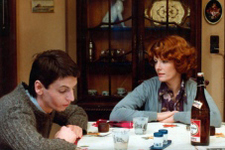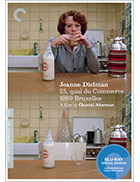Jeanne Dielman, 23, Quai du Commerce, 1080 Bruxelles
|  The title of Chantal Akerman’s singular Jeanne Dielman, 23, Quai du Commerce, 1080 Bruxelles tells us everything and nothing. We have a woman’s name and her address, which on the surface provides us fundamental information about her identity, but tells us not a thing about the woman herself: what she thinks, what she feels, what she loves, what she fears—in essence, her real identity, who she is. And it is precisely that lack of identity that drives the film and keeps us riveted even though it is so bereft of what we would typically consider events of dramatic import. The title, then, establishes the film’s main character (who appears in virtually every shot in the film) and where the majority of the action takes place, but it tells us nothing of the film’s maddening, hypnotic, fascinating, mundane, electrifying, mind-numbing, and ultimately shocking nature. The story is structured as a portrait of three days in the life of a seemingly ordinary middle-class widow and mother named Jeanne Dielman (Delphine Seyrig). The film is told entirely in static medium and medium long shots, which both privilege and deny visual information. On the one hand, the camera’s studious intrusion into domestic spaces that are usually left out of filmic narratives gives us an undeniably fascinating sense of fly-on-the-wall surveillance (or, better yet, voyeurism), yet the camera is also frustratingly restrictive in the way it refuses to move when Jeanne walks past, sometimes just sitting there when she leaves the frame, fixed on an empty room or hallway as if waiting for her return. Akerman’s aesthetic, which is also shorn of extradiegetic music (that most emotionally manipulative of devices), seems primed to deny many of the typical pleasures of Hollywood cinema, most directly the close-up, that visual mainstay of the character study that allows us into a character’s personal space to observe all the physical details of his or her emotional terrain. At all times, Jeanne remains at a distance, sometimes even with her back turned to us for long periods of time (this is, in fact, how she is introduced in the film, washing dishes while turned away from the camera). As the film progresses, we get to know Jeanne’s daily routine, which consists almost exclusively of housework like cooking, cleaning, making the bed, folding laundry, and generally tidying up, all of which is punctuated with the rhythmic clacking of her heels on the hardwood and the ritualistic switching on and off of lights as she enters and leaves rooms. I say “almost exclusively” because there is one other activity in which Jeanne engages every day: prostituting herself in the afternoons. While this would seem to be a radically dramatic wrinkle in her otherwise mundane existence, it is treated with the same unwavering aesthetic, which effectively turns sex with strangers for money into yet another part of the daily routine. The fact that Jeanne stores the money in a beautiful porcelain bowl that is the centerpiece on the dining room table and gives the money to her rather sullen teenage son Sylvain (Jan Decorte) further intertwines the scandalous side job with ordinary domesticity. The one-bedroom flat in Brussels that Jeanne shares with Sylvain is neat and orderly and at first appears to be homey, although it eventually becomes suffocating. The real-time depiction of Jeanne’s repetitive chores—the “hidden labors” of the domestic realm that, prior to this film, had never been the focus of the camera and are thus the center of Akerman’s argument that Jeanne Dielman is a feminist film—forces us to consider them at length in a way that we normally would not, not even when doing them ourselves. It is a brilliant and unnerving way of making the ordinary seem alien, and we start to feel what we are quite sure Jeanne must also feel: boredom and alienation. Like the experimental real-time films of Andy Warhol, Jeanne Dielman makes time its organizing device, in the process causing us to question the very nature of time itself and how it shapes our understanding of even the most mundane events. Akerman plays with details, and those who observe closely start to recognize the unraveling of Jeanne’s world during the third day, not in ways that are grandly dramatic, but rather small and, in their own way, even more distressing for their lack of grandeur. At all times, though, Akerman relentlessly keeps us at arm’s distance from Jeanne, refusing us entry into her psyche, which forces us to glean it for ourselves off the surfaces of her daily routines. We gradually learn bits and pieces about her life—that her husband died six years ago and she refuses to remarry, that she has a sister who lives in Canada—but she never overtly reveals herself psychologically. In one scene Sylvain explains a dream he had of sexual violence, and she simply tells him that he shouldn’t worry about it, which suggests an obvious level of sexual repression that has great explanatory potential, yet somehow feels woefully inadequate. It seems more like that Jeanne is meant to be an enigma, which is reflected in Akerman’s canny casting choice. While Jeanne is clearly meant to be an “ordinary” woman going about an “ordinary” life, Akerman did not cast an unknown, but rather Delphine Seyrig, whose starring roles in such films as Alain Resnais’s Last Year at Marienbad (1961) and Luis Buñuel’s The Discreet Charm of the Bourgeoisie (1972) had given her a kind of star power among the art film crowd that was most likely to attend a film like Jeanne Dielman. Thus, Jeanne is simultaneously a very specific woman and an “everywoman,” which gives the film a sharp dual edge with which it cuts through the banality of hidden labor and exposes the dark recesses beneath.
Copyright © 2017 James Kendrick Thoughts? E-mail James Kendrick All images copyright © The Criterion Collection | |||||||||||||||||||||||||||||||
Overall Rating: 


 (4)
(4)


